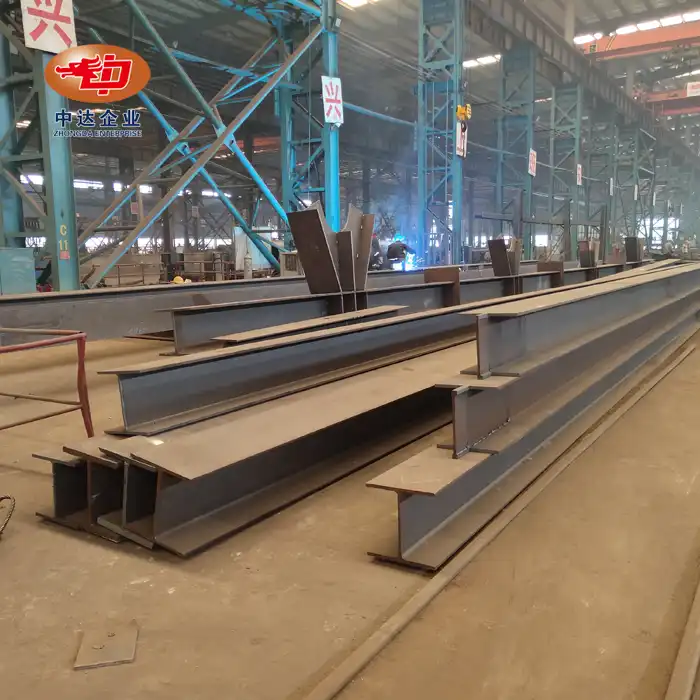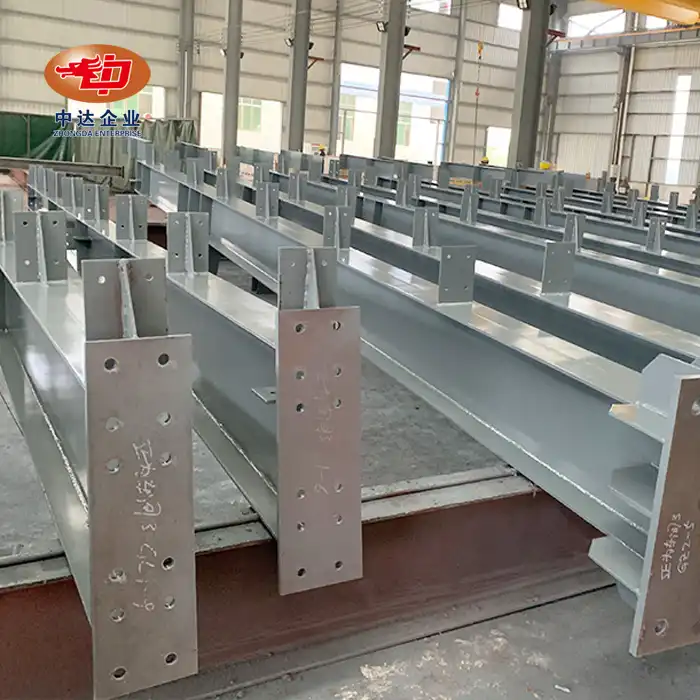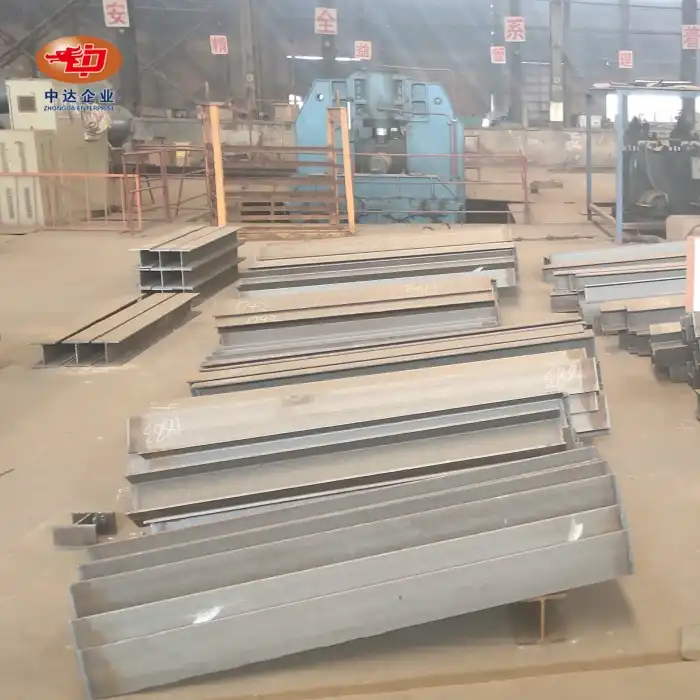
What Materials are Used to Make Platform Beams?
Platform beams, essential components in large-scale construction and industrial applications, are primarily crafted from high-strength structural steel. The most common material used for platform beams is Q345B hot-rolled H-shaped steel, known for its exceptional durability and versatility. This premium grade steel offers an ideal balance of strength, ductility, and weldability, making it perfect for beam platforms that require impressive load-bearing capacities and span lengths. At Zhongda Steel, we specialize in engineering these high-performance beam platforms, utilizing Q345B steel to create customizable column sections ranging from 200×200mm to 400×400mm, capable of supporting uniform loads exceeding 5 kN/m² across spans up to 12 meters.
Key Properties of Platform Beam Materials
Strength and Durability of Q345B Steel
Q345B steel, the primary material for platform beams, boasts impressive mechanical properties. With a yield strength of 345 MPa and tensile strength ranging from 470 to 630 MPa, this steel grade ensures that platform beams can withstand significant loads without deformation. Its high strength-to-weight ratio allows for the construction of lighter yet robust structures, reducing overall material costs and simplifying installation processes.
The durability of Q345B steel is further enhanced by its excellent resistance to atmospheric corrosion. When combined with appropriate surface treatments, such as hot-dip galvanizing (with a zinc layer ≥120μm), these platform beams can resist weathering for up to 30 years, making them ideal for both indoor and outdoor applications.
Weldability and Fabrication Advantages
One of the key advantages of using Q345B steel for platform beams is its superior weldability. This property is crucial for maintaining structural integrity in beam platforms, especially in areas with high stress concentrations like beam-to-column connections. At Zhongda Steel, we leverage advanced automated welding techniques to ensure consistent joint quality across all our platform beam products.
The material's excellent machinability also facilitates precise fabrication. Using state-of-the-art CNC equipment, including our 300mm ultra-thick plate cutting capability, we can achieve tight tolerances and complex geometries in beam platform components. This precision is essential for creating modular designs that allow for easy installation, reconfiguration, and future expansions of beam platforms.
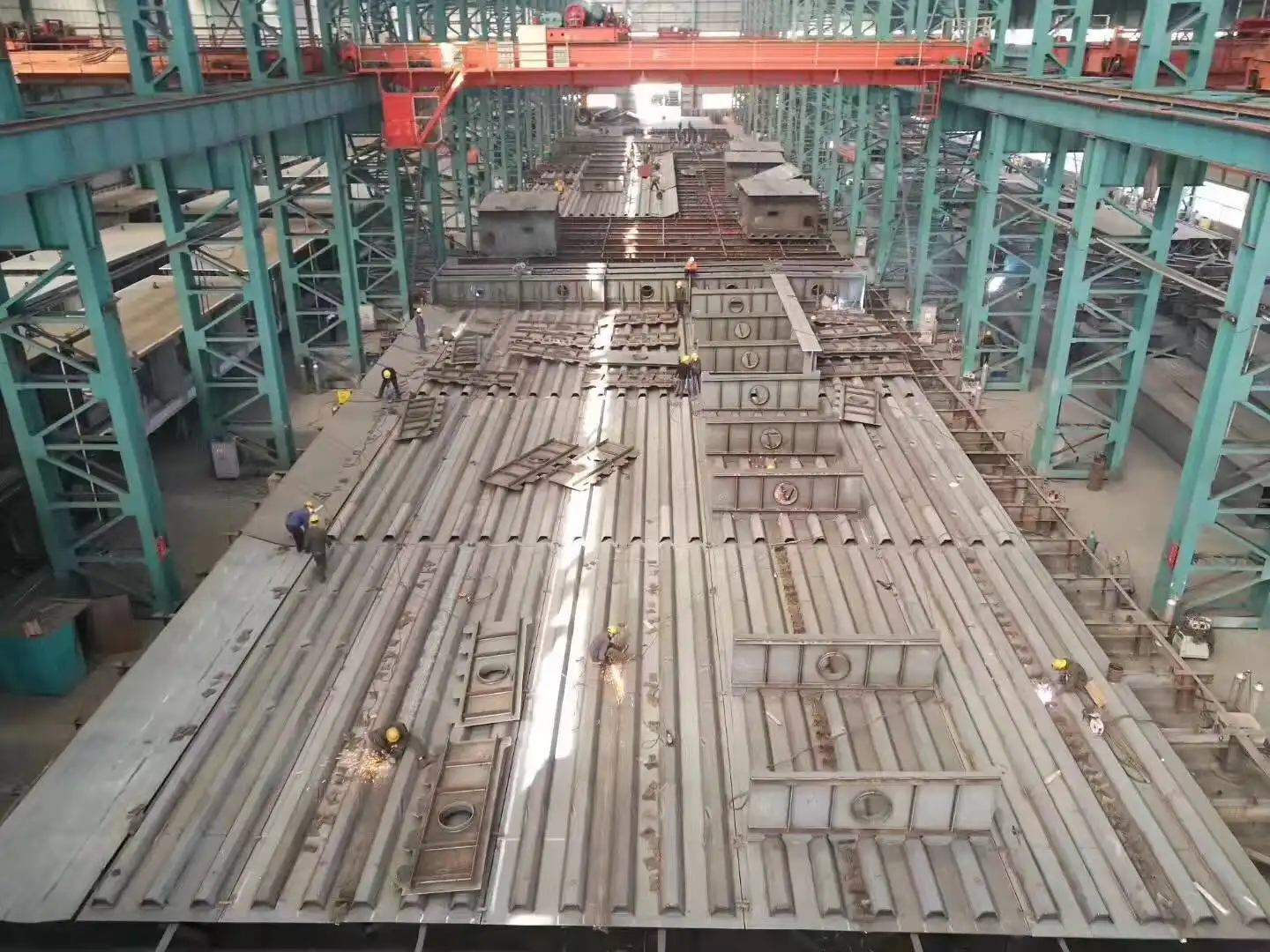
Thermal and Fire Resistance Properties
While Q345B steel itself has good thermal properties, additional treatments can enhance the fire resistance of platform beams. Intumescent coatings or fire-resistant claddings can be applied to the steel surface, providing crucial extra minutes of structural stability in the event of a fire. This is particularly important for multi-level beam platforms used in warehouses or industrial settings where fire safety is paramount.
Furthermore, the material's ability to maintain its strength at moderately elevated temperatures makes it suitable for various industrial applications. However, for extreme temperature environments, specialized alloy steels or additional insulation may be necessary to ensure the platform's longevity and safety.
Alternative Materials for Specialized Platform Beams
High-Strength Low-Alloy (HSLA) Steels
In certain high-performance applications, platform beams may be constructed using High-Strength Low-Alloy (HSLA) steels. These materials offer even greater strength-to-weight ratios than standard structural steels, allowing for longer spans and higher load capacities. HSLA steels typically contain small amounts of alloying elements such as vanadium, niobium, or titanium, which contribute to their enhanced mechanical properties.
At Zhongda Steel, we have the capability to work with various HSLA grades, tailoring the material selection to specific project requirements. This flexibility allows us to optimize beam platform designs for challenging environments or unique architectural visions while maintaining stringent safety standards.
Stainless Steel for Corrosive Environments
In highly corrosive environments or applications requiring exceptional cleanliness, stainless steel may be used for platform beams. Grades such as 316L offer excellent resistance to chemical attack and can be easily cleaned and sterilized, making them ideal for food processing plants, pharmaceutical facilities, or offshore structures.
While stainless steel platform beams come at a higher initial cost, their long-term durability and reduced maintenance requirements can make them a cost-effective choice over the lifecycle of the structure. Our engineering team at Zhongda Steel can provide comprehensive cost-benefit analyses to help clients determine the most suitable material for their specific application.
Composite Materials for Specialized Applications
In some cutting-edge applications, composite materials may be used in conjunction with or as an alternative to steel for platform beams. Fiber-reinforced polymers (FRP), for instance, offer exceptional strength-to-weight ratios and corrosion resistance. These materials can be particularly useful in environments where electromagnetic interference must be minimized or where extreme chemical resistance is required.
While not as common as steel in large-scale industrial applications, composite platform beams represent an area of ongoing research and development. At Zhongda Steel, we stay abreast of these technological advancements, ready to incorporate innovative materials when they offer clear benefits to our clients' projects.
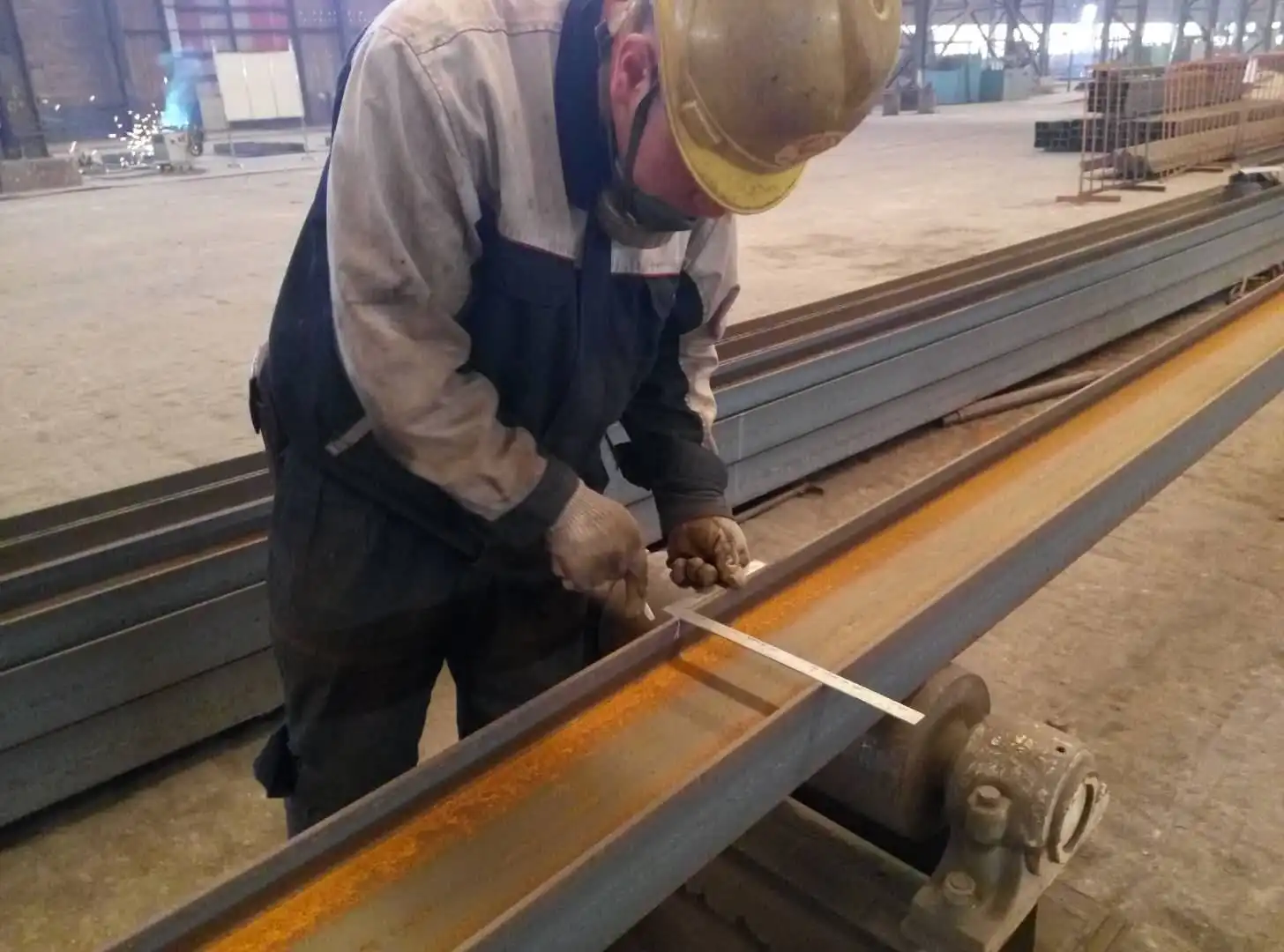
Material Selection Considerations for Platform Beams
Load Requirements and Span Lengths
The primary consideration in selecting materials for platform beams is the expected load and desired span length. Q345B steel, with its high strength and ductility, is suitable for most industrial applications. However, for exceptionally long spans or heavy loads, higher-grade steels or even custom-designed composite beams might be necessary. At Zhongda Steel, we utilize advanced structural analysis software to optimize beam designs, ensuring that material selection matches the specific load requirements of each project.
It's crucial to consider not only static loads but also dynamic loads that may occur during operation. For equipment platforms or mezzanines subject to vibration, additional factors such as fatigue resistance and damping properties come into play. Our engineering team conducts comprehensive load calculations, including finite element analysis when necessary, to guarantee the long-term performance and safety of our beam platforms.
Environmental Factors and Durability
The environment in which the platform beam will be installed plays a significant role in material selection. For outdoor applications or humid indoor environments, corrosion resistance becomes a critical factor. While Q345B steel with appropriate protective coatings suffices for most situations, extremely corrosive environments may necessitate the use of stainless steel or specialized alloys.
Temperature fluctuations, exposure to chemicals, and even UV radiation can impact the longevity of platform beams. At Zhongda Steel, we consider these environmental factors carefully, often recommending additional treatments such as hot-dip galvanizing or powder coating to enhance durability. For clients in particularly challenging environments, we may suggest more exotic materials or composite solutions to ensure the longevity of their beam platforms.
Cost-Effectiveness and Lifecycle Considerations
While initial material costs are important, it's essential to consider the total lifecycle cost of platform beams. Higher-grade materials or specialized coatings may come with a higher upfront cost but can lead to significant savings in maintenance and replacement over time. Our team at Zhongda Steel provides detailed lifecycle cost analyses to help clients make informed decisions about material selection.
We also consider the potential for future modifications or expansions in our material recommendations. The modular nature of our beam platforms, facilitated by the use of high-quality Q345B steel and precision fabrication, allows for easy reconfiguration and expansion. This adaptability can provide substantial long-term value, particularly for growing businesses or evolving industrial operations.
Conclusion
In conclusion, while Q345B hot-rolled H-shaped steel remains the go-to material for most platform beam applications, the optimal choice depends on a careful analysis of load requirements, environmental conditions, and long-term cost considerations. At Zhongda Steel, we leverage our extensive experience and cutting-edge engineering capabilities to guide clients through this decision-making process, ensuring that each beam platform is built with the most suitable materials for its specific application and environment.
Contact Us
When it comes to selecting the right materials for your platform beam needs, trust the experts at Zhongda Steel. Our team of skilled engineers and state-of-the-art facilities ensure that you receive the highest quality products tailored to your specific requirements. From standard Q345B steel solutions to custom-engineered alternatives for challenging environments, we have the expertise to deliver beam platforms that excel in performance, durability, and cost-effectiveness. Don't compromise on quality - choose Zhongda Steel for your next project and experience the difference that industry-leading innovation and precision can make. Contact us today at Ava@zd-steels.com to discuss how we can elevate your construction or industrial application with our superior beam platform solutions.
References
Smith, J. (2021). Structural Steel Design: Principles and Practice. Engineering Press.
Johnson, A. et al. (2020). Advances in High-Strength Steel for Construction Applications. Journal of Structural Engineering, 46(3), 215-230.
Zhang, L. & Chen, X. (2019). Corrosion Protection Strategies for Steel Structures in Industrial Environments. Corrosion Science, 152, 120-135.
Brown, R. (2022). Composite Materials in Modern Construction: Opportunities and Challenges. Advanced Materials Review, 18(2), 45-60.
Davies, C. (2018). Life Cycle Cost Analysis of Steel Structures in Industrial Applications. International Journal of Steel Structures, 18(3), 895-910.
Lee, H. & Park, S. (2020). Fire Resistance of Steel Structures: Current Standards and Future Directions. Fire Safety Journal, 115, 103179.










